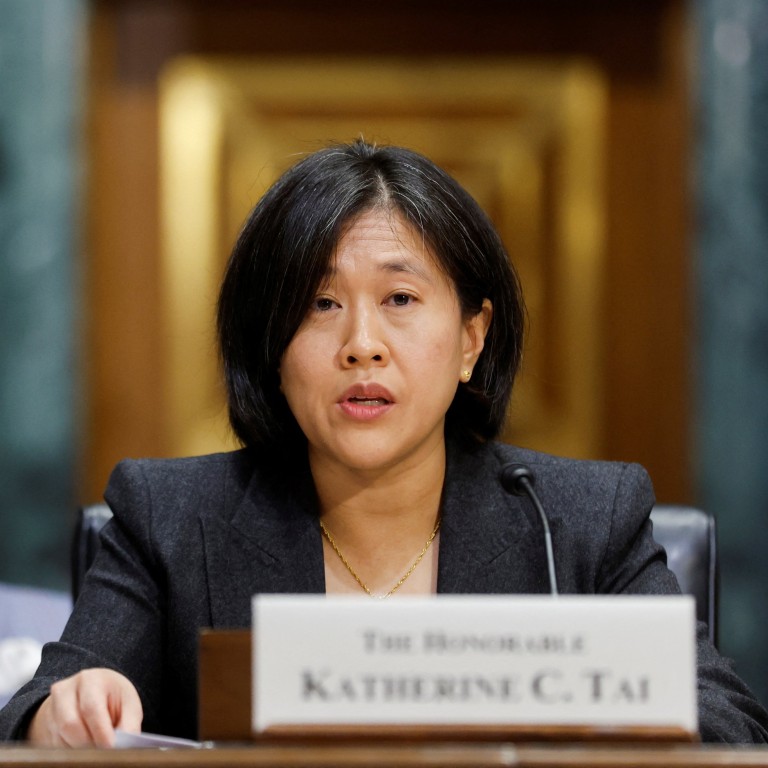
US lawmakers push Washington’s trade envoy to bring market access into Biden’s Indo-Pacific strategy
- President Joe Biden’s Indo-Pacific Economic Framework aims to improve environmental and labour standards
- Indo-Pacific nations ‘are crying out for free trade negotiations with us’, said one senator
Washington’s top trade envoy came under fire from lawmakers on Thursday in a second day of testimony about US President Joe Biden’s policies to improve economic engagement with more countries as a way to counter China’s growing influence.
“Why take the carrot of market access off the table?” asked the committee’s ranking member Mike Crapo, a Republican from Idaho.
“We’ve got nations in the Indo-Pacific who are crying out for free trade negotiations with us so that they can strengthen their relationship to us economically, rather than being tied to China,” he said.
Released in February, the IPEF makes “open principles” governing cross-border data flows; supply chains “that are diverse, open and predictable” and “shared investments in decarbonisation and clean energy” its key goals in addition to labour and environmental considerations, according to a White House fact sheet.
The IPEF also stresses the need for strong alliances and multilateral participation to maintain a free and open Indo-Pacific region, a point emphasised by the administration to differentiate it from years of “America First” policies under former president Donald Trump.
Tai faced scepticism from both sides of the aisle over whether the framework is ambitious enough.
Senator John Barrasso, a Republican from Wyoming, criticised the Biden administration for failing to address issues he had raised including intellectual property rights protections, World Trade Organization Reform, unfair Chinese trade practices and human rights violations.
Instead, he said, Biden is “exporting a wide array of liberal labour, social and environmental policies”.
‘Negotiate, don’t threaten’: US urged don’t point the finger, cut China tariffs
Senator Robert Menendez, a Democrat from New Jersey, said that while Tai characterised Congress as the administration’s “constitutional partner” on trade, “you haven’t acted that way”.
Other Democratic lawmakers, particularly those from major agricultural exporting states – including Washington’s Maria Cantwell – also expressed frustration over a lack of market access in the IPEF.
“I’m for the labour rights. I’m for enforcement. I’m for capacity building,” Cantwell said.
“But why can’t we be for opening market access right now and getting rid of tariffs, or at least getting the exclusions done on time?” she asked, referring to the process through which US companies can ask for exclusions to the punitive tariffs that Trump began imposing on Chinese imports in 2018.

Tai argued that while there was a place for free trade agreements in “the toolbox”, the administration was opening up markets in other ways, citing forums and dialogues with trade partners and the voiding of some US$20 billion worth of tariffs since she assumed her position a year ago.
Barrasso flagged China’s membership in the Regional Comprehensive Economic Partnership (RCEP) – a multilateral trade agreement that primarily reduces tariffs and other trade barriers in the region – as an example of how Beijing is currently “winning” on the economic front.
Tai disagreed, characterising RCEP as a “re-mix and match” of existing trade arrangements.
When asked if the Biden administration was thinking about entering talks aimed at joining the Comprehensive and Progressive Agreement for Trans-Pacific Partnership (CPTPP), she said: “We are pursuing economic engagement in the Indo-Pacific right now; that does not mean the CPTPP.”
Was the US-China phase-one trade deal a ‘historic failure’, and what’s next?
Washington led the negotiations on CPTPP’s predecessor, the Trans-Pacific Partnership, under then acting deputy US trade representative Wendy Cutler, but the pact became highly politicised during the 2016 presidential campaign. Trump withdrew from the bloc as one of his first acts in office.
“While the IPEF will include some trade elements, it by no means will be a traditional trade agreement, with the notable absence of market access,” Cutler, now vice-president at the Asia Society Policy Institute, said in an interview.
She said that in lieu of market access, the US needed to demonstrate to potential partners that the framework provides tangible benefits.
“If the Biden administration can ensure the IPEF is robust, substantive, inclusive and impactful, it stands a good chance of success,” she said.
“Time will tell whether the IPEF will be able to stand up against the CPTPP.”
Additional reporting by Jacob Fromer in Washington


